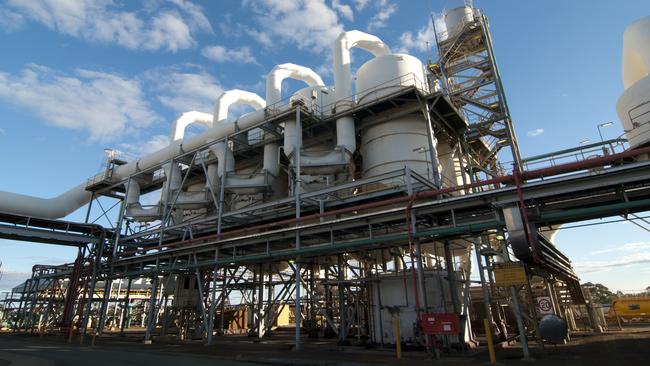BHP’s decision to close Nickel West may have been inevitable, but the impact will linger for years
BHP says it will do its best to minimise the impact of its Nickel West closure, but the mining industry in Western Australia will feel it for some time.

BHP’s decision to mothball its WA nickel division will send shockwaves through the state’s industry for months, as workers, contractors and other miners assess the potential impact to their own business.
The most immediate impact will be felt by rare earth miner Lynas, which relies on BHP’s nickel smelter for the supply of sulfuric acid needed for the company’s newly built cracking and leaching plant in Kalgoorlie.
BHP’s decision to mothball its WA nickel mines, smelter and Perth-based refinery came as little surprise to the industry, given the nickel price has been under substantial pressure from the rapid growth in Indonesian output.
The company has promised it will redeploy any of the division’s 1600-strong operational workforce to other roles within the company if they want to keep working for BHP, and will make “best efforts” to find new jobs for another 800 support and back-end workers.
Lynas said it has been working with BHP for some time on “contingencies” for acid supply if the mining giant elected to close its nickel operations, which produce sulphur as a by-product of the smelting process.
Lynas said on Friday its supply deal with BHP remains in place until 2027 — when BHP says it will consider reopening its Nickel West division — and includes the requirement for BHP to supply the acid from either its own operations or imported sources.
“In line with the terms of the supply contract, BHP has affirmed its commitment to using
reasonable efforts to supply imported acid to Lynas,” the company said.
The loss of a local acid supply will also force Glencore’s Murrin Murrin mine to rely entirely on imported sources, a spokesman for Glencore confirmed, but will not have a major impact on the nickel operation given Glencore already imports the bulk of its requirements.
BHP’s decision to halt construction work on its remote West Musgrave mine also knocked about 5 per cent from the market value of contractor GR Engineering, which was leading the work at the nickel and copper mine BHP acquired through its takeover of OZ Minerals last year.

GR Engineering said the decision to halt work at West Musgrave would strip about $80m from its revenue over the next year, and shares in the company closed down 10c, or 4.3 per cent, to $2.01 per share on Friday.
Also affected is FIFO airline Alliance Aviation, which flagged a $5m earnings hit for the current financial year as BHP halts flights to its WA mining operations at Leinster and Mt Keith. Alliance shares closed up 6c at $3.14 per share on Friday.
But, the major issue in the medium term for the WA nickel industry more broadly will be the loss of BHP’s Kambalda nickel smelter. In addition to some of BHP’s own production, the concentrator traditionally treated the ore of smaller nickel miners in the region.
The Kambalda concentrator has already been partially mothballed in the wake of the decision of Andrew Forrest’s Wyloo Metals to shutter its own nickel mines in the region.
But, the fact BHP will not be considering a restart until at least 2027 complicates any opportunity for Wyloo — and other smaller would-be WA nickel producers — to swing back into the market if a nickel price recovery comes ahead of this date.
WA nickel hopeful Lunnon Metals said on Friday it is looking at its own options in the wake of BHP’s decision, including potentially making an offer for the concentrator, building its own, or refurbishing one of the other facilities lying dormant in WA.
The closure of BHP’s Kalgoorlie smelter will also remove a major buyer of nickel concentrate produced elsewhere in the state, although the parlous state of the sector means the immediate impact will be minimal.
IGO is still understood to be delivering concentrate into the BHP smelter from its Nova and Forrestania mines. IGO’s last offtake deal was a five-year sales agreement signed in 2019, however, and the company is unlikely to have any difficulty finding an alternative buyer for its output.
While the ripple effects of the BHP decision will reverberate through the WA mining industry for years to come, the decision was welcomed by analysts on Friday.
Morgan Staney analyst Rahun Anand said the decision was “unsurprising”, given the state of the nickel sector.
“Given ongoing price/market volatility predominantly driven by ramping Indonesian supply, we also see today’s decision as prudent, as we had forecast BHP’s Nickel West operation to be loss-making in the coming years,” he said in a client note.
BHP is forecasting the need to spend up to $450m per year on care and maintenance costs for its Nickel West assets, suggesting its own projects included annual losses of least this amount if it kept the operations running.
Macquarie analysts said the decision showed BHP likely had no choice in its decision, given the company would probably need to spend at least $1bn or more in building a new smelter to give the division a long-term lease on life.
“The decision to bypass an upstream alternative via shipping concentrate chewed up resource for little margin accretion,” Macquarie analysts said.
“Interestingly, by not pursuing this option, BHP keeps the resource in ground where it may benefit in a price recovery or via divestment.”
BHP shares closed down 16c, or 0.4 per cent, on Friday to $43.40 per share.




To join the conversation, please log in. Don't have an account? Register
Join the conversation, you are commenting as Logout